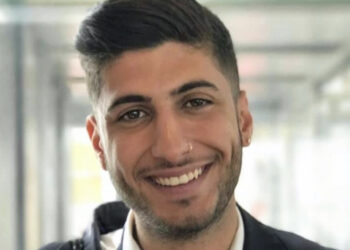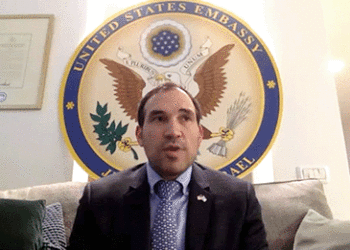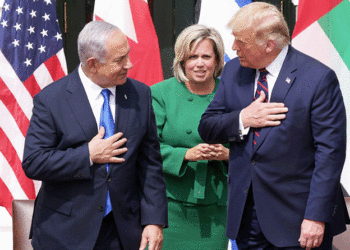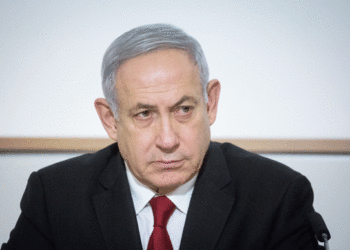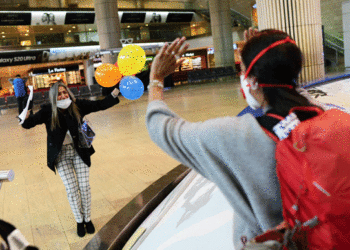Rabbi Arik Ascherman’s criticism of Israel is motivated by his vision of the country living up to our highest Jewish values
By MORDECAI SPECKTOR
In a widely distributed 2015 web video, Rabbi Arik Ascherman, then the director of Rabbis for Human Rights in Israel, is seen being attacked by a knife-wielding Jewish settler in the West Bank.
Fortunately, Ascherman, who was trying to stop a group of settlers from setting fire to Palestinian olive trees, suffered only minor injuries in the attack. Campaigning for social justice in the Israeli-occupied Palestinian territories comes with some risks.
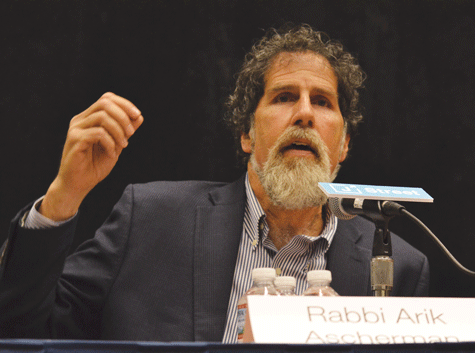
Ascherman, 58, recently visited the Twin Cities and spoke Nov. 29 at Macalester College. The tall, lean rabbi, a native of Erie, Penn., led Rabbis for Human Rights — which was founded, in 1988, by the late Rabbi David Forman — from 1995 to 2016. Last September, Ascherman formed a new human rights group called Torat Tzedek (Torah of Justice).
The interview with the Jerusalem-based rabbi took place at Temple Israel in Minneapolis. The remains of a tasty buffet was set out in the conference room, where Ascherman and a group of local rabbis had just finished a Torah study session. Frank Hornstein, a DFL state representative from Minneapolis, helped facilitate the meeting between the AJW and Ascherman, who visits the States two or three times a year on fundraising and speaking junkets.
After some light conversation, the rabbi steered the discussion to the dire situation faced by Palestinians living in Susya, a community in the South Hebron Hills. Israeli Defense Minister Avigdor Lieberman has notified Israel’s High Court of his intention to demolish about 40 percent of the village, where families already are living on the margins.
The misfortune of the Palestinians in Susya is a complicated story. Ascherman traced recent developments to the tenure of the late Plia Albeck, who ran the Civil Department of the State Prosecutor’s Office for more than two decades. Albeck’s rulings led to many areas beyond the 1967 Green Line border being declared state land.
In 1983, Albeck created a Jewish settlement, which also is named Susya. A decade later, she determined that the settlement had grossly encroached on neighboring Palestinian land.
“According to Israeli law, there are hundreds of structures in the South Hebron Hills settlements and outposts that are illegal,” Ascherman explained. He added that, in 1986, the Palestinians were expelled from Susya, which was found to be the site of an ancient synagogue. The villagers “moved onto their agricultural land, they lived in caves.”
In 2001, a Jewish settler in Susya was murdered. The Israel Defense Forces, “accompanied by settlers, came in, expelled everybody, destroyed the caves, filled in the water cisterns.” Israel’s High Court justices eventually allowed the Palestinians to return to Susya; “but they didn’t address the fact of how now are they going to put a roof over their heads,” said Ascherman. “They can’t rebuild the caves, anything else they try to build aboveground is illegal [as per Israeli law in the occupied territories]; so they were nisht ahir un nisht aher [neither here nor there, in limbo].”
Over the past six years, Israeli and Palestinian human rights groups have battled the Jewish settlers’ organization and the Israeli bureaucracy in an effort “to keep that community standing,” commented Ascherman, in reference to Susya.
Apart the work of Rabbis for Human Rights and other groups, Ascherman said that the successful defense of Palestinian Susya owed to “international concern, led by the United States.”
Following the 2016 president election, the lead lawyer for the villagers told Ascherman: “Susya is toast now.”
“Surprisingly, that didn’t happen. Everyone expected that would happen right away, but it didn’t,” noted Ascherman. He guessed that some of President’s Trump Mideast advisers realized that the U.S. would not be viewed as an honest broker for a peace settlement, if “entire villages” are being demolished by Israel
Torat Tzedek, Ascherman’s group, has taken on the work of “international advocacy” on behalf of Susya. In addition to organizing an international letter writing campaign, the rabbi has traveled to Washington, D.C., on several occasions to lobby on behalf of the beleaguered Palestinian villagers. (I met him in February, at the J Street annual conference in Washington, where he was on a panel discussing human rights in the occupied territories.)
There has been press coverage of the critical situation in Susya in some Israeli outlets over the years: Haaretz, the Jerusalem Post, etc.
“One of the challenges is that Israelis have a sort of fatigue, in terms of dealing with the issue of the occupied territories,” allowed Ascherman. The public has acquiesced to the government’s line that “there’s no partner for peace, and therefore there’s nothing we can but maintain the current situation — we can’t actually solve anything.”
In Ascherman’s view, that argument “is patently false.”
In the course of a fascinating discussion of the BDS movement and its opponents in the U.S. Jewish community, which is beyond the scope of this article, Ascherman said, “My job is to talk about what’s wrong with Israel.”
He acknowledged that enemies of Israel will use his words “in ways that I did not intend… You cannot use my words to justify the de-legitimization of Israel’s existence.”
On the other hand, Ascherman hears from staunch critics of Israel who are heartened by his efforts to make Israel a better, more humane place. The mere fact that Israelis are struggling to end the occupation improves the tarnished image of Israel, in the minds of these antagonists.
“So it really works both ways,” Ascherman pointed out.
He added that his work is motivated by a vision of an Israel that “lives up to our highest Jewish values, lives up to our own Declaration of Independence.
“Our dream — not what the outside world wanted us to do, not what some hostile anti-Semites wanted — our dream was that we were going to build a country based on herut, tzedek v’shalom, freedom, justice and peace as envisioned by the prophets of Israel, and that would guarantee total social and political equality for all, regardless of religion, nationality or gender.”










